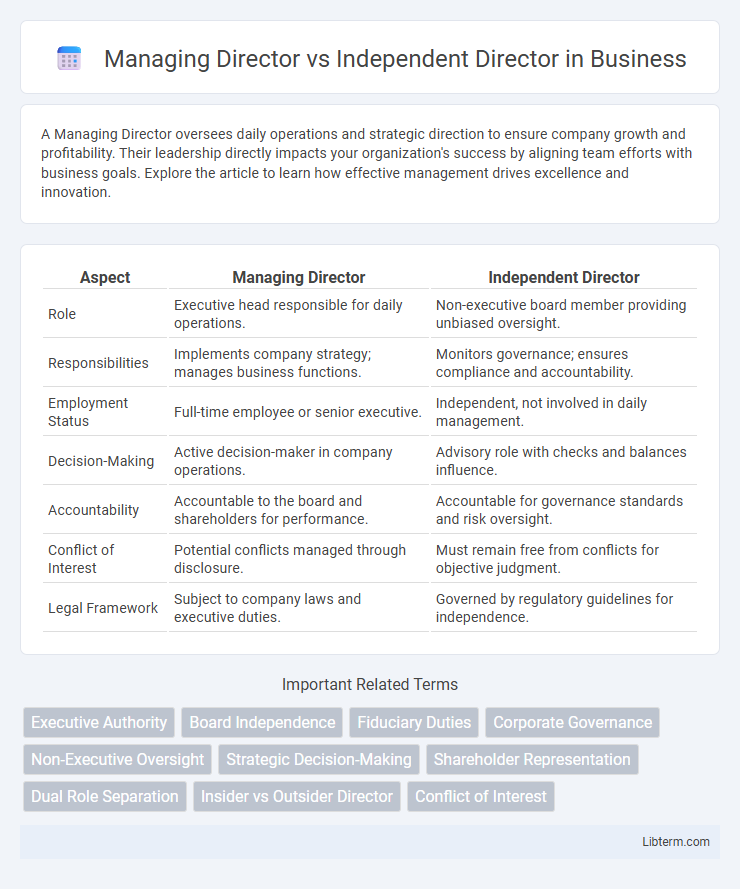A Managing Director oversees daily operations and strategic direction to ensure company growth and profitability. Their leadership directly impacts your organization's success by aligning team efforts with business goals. Explore the article to learn how effective management drives excellence and innovation.
Table of Comparison
| Aspect | Managing Director | Independent Director |
|---|---|---|
| Role | Executive head responsible for daily operations. | Non-executive board member providing unbiased oversight. |
| Responsibilities | Implements company strategy; manages business functions. | Monitors governance; ensures compliance and accountability. |
| Employment Status | Full-time employee or senior executive. | Independent, not involved in daily management. |
| Decision-Making | Active decision-maker in company operations. | Advisory role with checks and balances influence. |
| Accountability | Accountable to the board and shareholders for performance. | Accountable for governance standards and risk oversight. |
| Conflict of Interest | Potential conflicts managed through disclosure. | Must remain free from conflicts for objective judgment. |
| Legal Framework | Subject to company laws and executive duties. | Governed by regulatory guidelines for independence. |
Introduction to Director Roles
Managing Directors are executive leaders responsible for the day-to-day operations and strategic direction of a company, actively involved in management decisions and implementation. Independent Directors serve on the board without day-to-day management responsibilities, providing unbiased oversight, governance, and safeguarding shareholder interests. The distinction between these roles ensures balanced corporate governance by combining operational leadership with independent supervision.
Definition of Managing Director
A Managing Director is a senior executive responsible for the overall day-to-day operations and strategic management of a company, often holding executive authority to make key decisions. In contrast, an Independent Director serves on the board without executive responsibilities, providing unbiased oversight and ensuring corporate governance. The Managing Director typically acts as the link between the board and the company's operational management.
Definition of Independent Director
An Independent Director is a board member who does not have any material or pecuniary relationship with the company, its management, or its affiliates, ensuring unbiased judgment in corporate governance. Unlike a Managing Director, who is actively involved in the day-to-day operations and management of the company, an Independent Director provides objective oversight and protects shareholders' interests. Independent Directors are essential in maintaining transparency and accountability within the board by bringing external perspectives free from conflicts of interest.
Core Responsibilities Compared
Managing Directors hold executive authority, overseeing daily operations, strategic planning, and organizational management to drive company performance. Independent Directors provide unbiased oversight by ensuring governance, monitoring management actions, and protecting shareholder interests without involvement in daily management. Their core responsibilities diverge as Managing Directors execute company strategies, while Independent Directors safeguard corporate compliance and accountability.
Appointment and Selection Process
The appointment of a Managing Director typically involves nomination by the board of directors, followed by shareholder approval during a general meeting, emphasizing the candidate's managerial expertise and alignment with company strategy. Independent Directors are selected based on strict criteria outlined by regulatory bodies, ensuring no material relationships with the company to maintain unbiased governance, with appointments approved by the board and ratified by shareholders. The selection process for Independent Directors prioritizes independence and compliance with corporate governance codes to enhance board effectiveness and shareholder trust.
Legal and Regulatory Framework
Managing Directors are executive members involved in day-to-day operations and are subject to company laws such as the Companies Act 2013 in India, which mandates fiduciary duties and accountability to the board. Independent Directors, governed by regulatory frameworks like SEBI Listing Obligations and Disclosure Requirements (LODR) Regulations 2015, are required to maintain autonomy, providing oversight without executive powers. Legal provisions emphasize conflict of interest prevention, with Independent Directors playing a crucial role in corporate governance by ensuring transparency and protecting shareholder interests.
Role in Corporate Governance
The Managing Director (MD) oversees daily operations and implements board policies, ensuring strategic goals align with company performance. Independent Directors contribute to corporate governance by providing unbiased judgment, monitoring management actions, and safeguarding shareholder interests. The balance between an MD's executive role and the Independent Director's oversight enhances transparency, accountability, and board effectiveness in corporate governance.
Key Skills and Qualifications
Managing Directors require strategic leadership, operational expertise, and strong decision-making skills to drive company performance, typically holding advanced degrees in business or management with extensive industry experience. Independent Directors emphasize governance, regulatory compliance, and risk management capabilities, often bringing legal, financial, or audit backgrounds to ensure unbiased oversight. Both roles demand excellent communication and ethical judgment but diverge in their focus on executive management versus board-level supervision.
Impact on Company Performance
Managing Directors actively influence daily operations and strategic decision-making, leading to direct impact on company performance through effective leadership and execution. Independent Directors provide unbiased oversight and enhance corporate governance, reducing risks and improving investor confidence, which indirectly supports long-term financial stability. The balance between active management and independent supervision is crucial for optimal company performance and sustainable growth.
Conclusion: Choosing the Right Director
Selecting the right director hinges on the company's strategic needs and governance goals. A Managing Director drives daily operations and implements business strategies, ensuring active leadership within the organization. An Independent Director offers unbiased oversight and strengthens corporate governance, promoting transparency and protecting shareholder interests.
Managing Director Infographic

 libterm.com
libterm.com